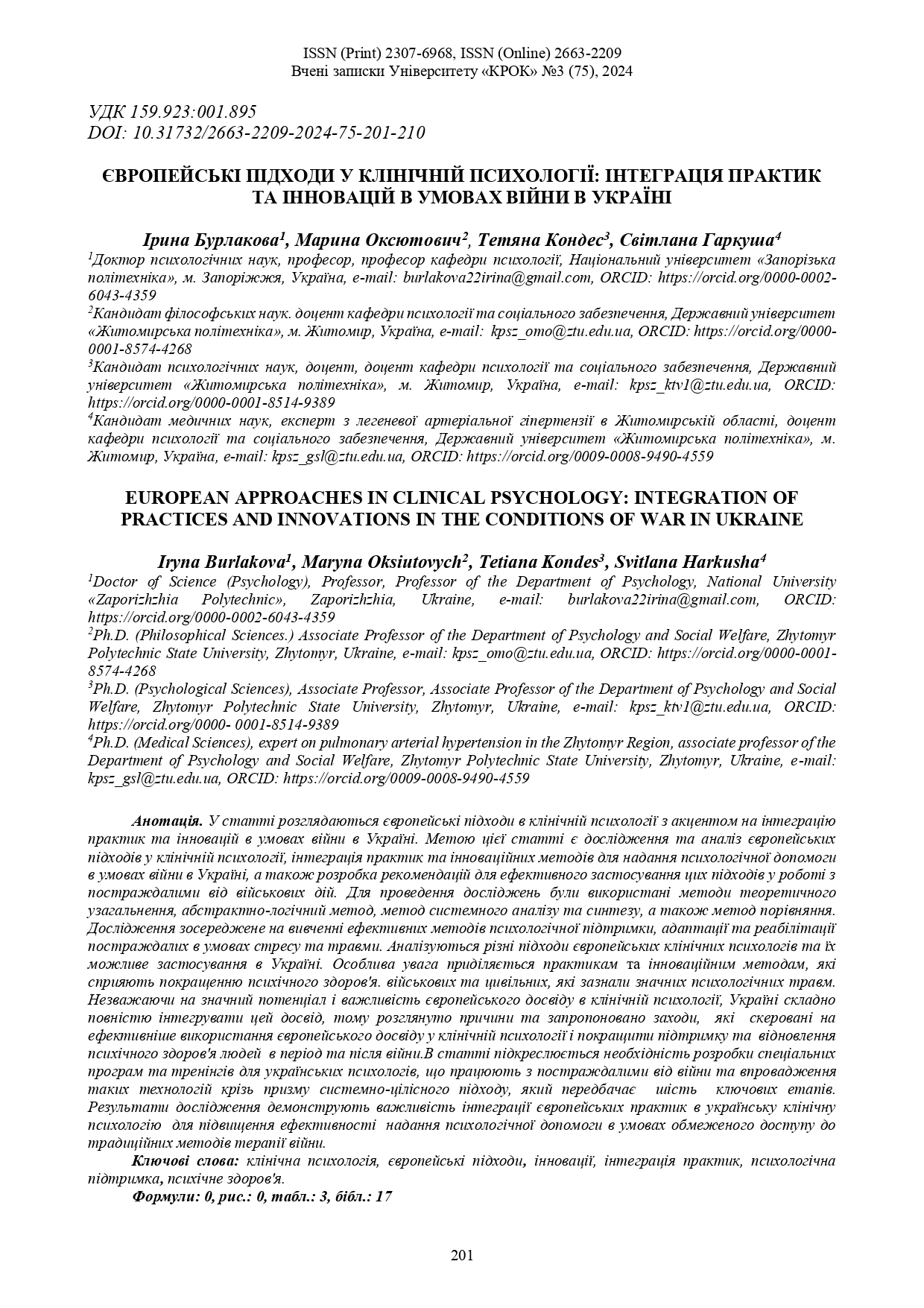EUROPEAN APPROACHES IN CLINICAL PSYCHOLOGY: INTEGRATION OF PRACTICES AND INNOVATIONS IN THE CONDITIONS OF WAR IN UKRAINE
DOI:
https://doi.org/10.31732/2663-2209-2024-75-201-210Keywords:
clinical psychology, european approaches, innovations, integration of practices, psychological support, mental healthAbstract
The article examines European approaches in clinical psychology with an emphasis on the integration of practices and innovations in the conditions of war in Ukraine. The purpose of this article is the research and analysis of European approaches in clinical psychology, the integration of practices and innovative methods for providing psychological assistance in the conditions of war in Ukraine, as well as the development of recommendations for the effective application of these approaches in working with victims of military operations. The methods of theoretical generalization, the abstract-logical method, the method of system analysis and synthesis, and the method of comparison were used to conduct the research. The research is focused on the study of effective methods of psychological support, adaptation and rehabilitation of victims in conditions of stress and trauma. Different approaches of European clinical psychologists and their possible application in Ukraine are analyzed. Special attention is paid to practices and innovative methods that contribute to the improvement of mental health. military and civilians who suffered significant psychological trauma. Despite the significant potential and importance of European experience in clinical psychology, it is difficult for Ukraine to fully integrate this experience, therefore, the reasons are considered and measures are proposed that are aimed at more effective use of European experience in clinical psychology and improve the support and recovery of people's mental health during and after war. The article emphasizes the need to develop special programs and trainings for Ukrainian psychologists working with victims of the war and the introduction of such technologies through the prism of a systemic and holistic approach, which involves six key stages. The results of the study demonstrate the importance of integrating European practices into Ukrainian clinical psychology to increase the effectiveness of providing psychological assistance in conditions of limited access to traditional methods of war therapy.
Downloads
References
Карамушка, Л. (2024). Обгрунтування управлінських рішень щодо забезпечення психологічного здоров’я персоналу організацій під час російсько-української війни. Вчені записки Університету «КРОК», (2(74), 237–251.
Кьоніґштайн Г. (2020) Як заповнити прогалину в лікуванні психічних розладів для 6,4 млн українців. Психічне здоров'я для України (MH4Ukraine).
Предко, В. В., & Сомова, О. О. (2022). Вплив війни на зміну рівня стресу та стратегій збереження життєстійкості українців. Вчені записки ТНУ імені В.І. Вернадського. Серія: Психологія, 33(72/4), 89-98.
Царенко, Л. Г. (2018). Українські традиційні моделі здоров’я. Психологічний часопис, 2, 100–113.
Aleksina, N., Gerasimenko, O., Lavrynenko, D., & Savchenko, O. (2024). Ukrainian adaptation of the Generalized Anxiety Disorder scale (GAD-7): diagnostic experience in the state of martial law. Insight: The Psychological Dimensions of Society, 11, 77-103.
Berryhill M.B., Halli-Tierney A., Culmer N., Williams N., Betancourt A., King M., Ruggles H.,(2019) Videoconferencing psychological therapy and anxiety: a systematic review. Family Practice, 36:1, 53–63.
Bisson, J. I., Cosgrove, S., Lewis, C., & Roberts, N. P. (2013). Post-traumatic stress disorder. BMJ, 347, f5578.
Bogdanov, S., Müller, M., & Schröder, H. (2017). Mental health of internally displaced persons in Ukraine: The role of coping strategies. European Journal of Psychotraumatology, 8(2), 1361492.
Burlakova, I., Chernysh, O., Kondes, T. (2024). Clinical psychology in the EU: a comparative analysis of best practices. Public Administration and Law Review, (2(18), 77–85.
Burlakova, I.; Kondes, T.; Sheviakov, O. (2020). Cognitive approach to corporate well-being management.International conference on Economics, Accounting and Finance,Estonia, jul. 2020.
Burlakova, I., Sheviakov, O., Kondes, T. (2021). Psychological predictors of the formation of health-preserving competentness of future specialists. Public Administration and Law Review, (4), 74–79.
Burlakova, I., Sheviakov, O., Kondes, T., Kornienko, V., Ostapenko, I., & Gerasimchuk, O. (2022). Social and pedagogical aspects of occupational health of specialists. Pedagogy and Education Management Review, (4), 38–43.
Chorna, V. V. (2020). Reforming healthcare to strengthen the mental health of the population of Ukraine and the experience of EU countries. Reports of Vinnytsia National Medical University, 24(3), 469-478.
Kuhn, E., Greene, C., Hoffman, J., Nguyen, T., Wald, L., Schmidt, J., & Ruzek, J. (2014). Preliminary evaluation of PTSD Coach, a smartphone app for post-traumatic stress symptoms. Military Medicine, 179(1), 12-18.
Litz, B. T., Stein, N., Delaney, E., Lebowitz, L., Nash, W. P., Silva, C., & Maguen, S. (2015). Moral injury and moral repair in war veterans: A preliminary model and intervention strategy. Clinical Psychology Review, 29(8), 695-706.
Prohaska, К. (2015). Mindfulness-Based Stress Reduction for Enhancing Psychological Well-being: A Meta-Analysis of Randomized Controlled Trials. Journal of Clinical Psychology. 71(4), 404-415.
Seleznova, V., Pinchuk, I., Feldman, I. et al. The battle for mental well-being in Ukraine: mental health crisis and economic aspects of mental health services in wartime. Int J Ment Health Syst 17, 28 (2023).

Downloads
Published
How to Cite
Issue
Section
License

This work is licensed under a Creative Commons Attribution-NonCommercial 4.0 International License.

